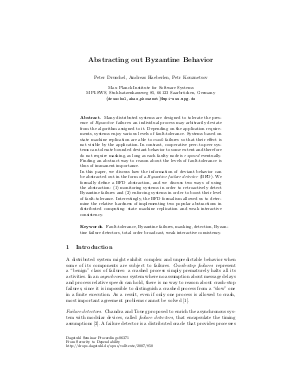Abstracting out Byzantine Behavior
Authors Peter Druschel, Andreas Haeberlen, Petr Kouznetsov
-
Part of:
Volume:
Dagstuhl Seminar Proceedings, Volume 6371
Part of: Series: Dagstuhl Seminar Proceedings (DagSemProc) - License:
 Creative Commons Attribution 4.0 International license
Creative Commons Attribution 4.0 International license
- Publication Date: 2007-01-10
File

PDF
DagSemProc.06371.3.pdf
- Filesize: 211 kB
- 12 pages
Document Identifiers
Subject Classification
Keywords
- Fault-tolerance
- Byzantine failures
- masking
- detection
- total order broadcast
- weak interactive consistency
Metrics
- Access Statistics
-
Total Accesses (updated on a weekly basis)
0Document
0Metadata
Abstract
Many distributed systems are designed to tolerate the presence of emph{Byzantine} failures: an individual process may arbitrarily deviate from the algorithm assigned to it.
Depending on the application requirements, systems enjoy various levels of fault-tolerance. Systems based on state machine replication are able to emph{mask} failures so that their effect is not visible by the application. In contrast, cooperative peer-to-peer systems can tolerate bounded deviant behavior to some extent and therefore do not require masking, as long as each faulty node is emph{exposed}eventually. Finding an abstract way to reason about the levels of fault-tolerance is thus of immanent importance.
We discuss how the information of deviant behavior can be abstracted out in the form of a emph{Byzantine failure detector} (BFD). We formally define a BFD abstraction, and
we discuss two ways of using the abstraction: (1) monitoring systems in order to retroactively detect Byzantine failures and (2) enforcing systems in order to boost their level of fault-tolerance. Interestingly, the BFD formalism allowed us to determine the relative hardness of implementing two popular abstractions in distributed computing: state machine replication and weak interactive consistency.
Cite As Get BibTex
Peter Druschel, Andreas Haeberlen, and Petr Kouznetsov. Abstracting out Byzantine Behavior. In From Security to Dependability. Dagstuhl Seminar Proceedings, Volume 6371, pp. 1-12, Schloss Dagstuhl – Leibniz-Zentrum für Informatik (2007)
https://doi.org/10.4230/DagSemProc.06371.3
BibTex
@InProceedings{druschel_et_al:DagSemProc.06371.3,
author = {Druschel, Peter and Haeberlen, Andreas and Kouznetsov, Petr},
title = {{Abstracting out Byzantine Behavior}},
booktitle = {From Security to Dependability},
pages = {1--12},
series = {Dagstuhl Seminar Proceedings (DagSemProc)},
ISSN = {1862-4405},
year = {2007},
volume = {6371},
editor = {Christian Cachin and Felix C. Freiling and Jaap-Henk Hoepman},
publisher = {Schloss Dagstuhl -- Leibniz-Zentrum f{\"u}r Informatik},
address = {Dagstuhl, Germany},
URL = {https://drops.dagstuhl.de/entities/document/10.4230/DagSemProc.06371.3},
URN = {urn:nbn:de:0030-drops-8501},
doi = {10.4230/DagSemProc.06371.3},
annote = {Keywords: Fault-tolerance, Byzantine failures, masking, detection, total order broadcast, weak interactive consistency}
}
